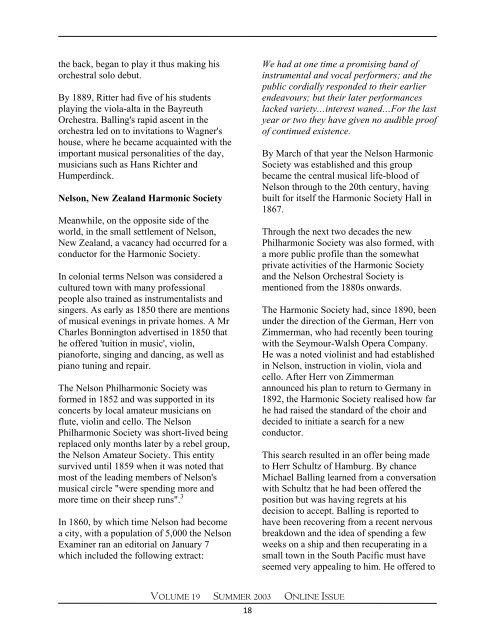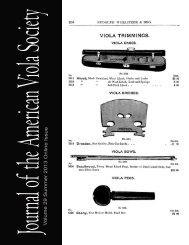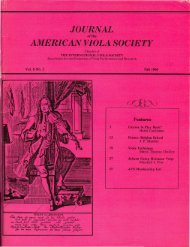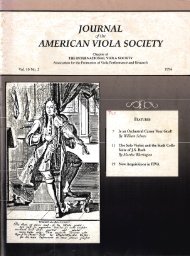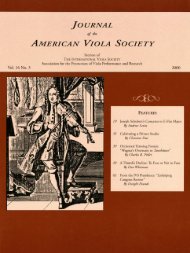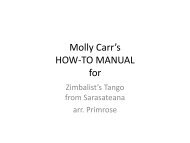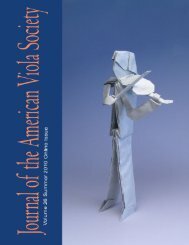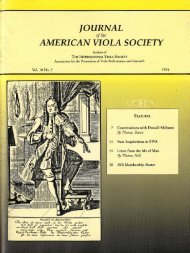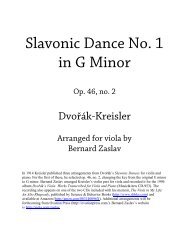Journal of the American Viola Society Volume19 Online, Summer ...
Journal of the American Viola Society Volume19 Online, Summer ...
Journal of the American Viola Society Volume19 Online, Summer ...
Create successful ePaper yourself
Turn your PDF publications into a flip-book with our unique Google optimized e-Paper software.
<strong>the</strong> back, began to play it thus making his<br />
orchestral solo debut.<br />
By 1889, Ritter had five <strong>of</strong> his students<br />
playing <strong>the</strong> viola-alta in <strong>the</strong> Bayreuth<br />
Orchestra. Balling's rapid ascent in <strong>the</strong><br />
orchestra led on to invitations to Wagner's<br />
house, where he became acquainted with <strong>the</strong><br />
important musical personalities <strong>of</strong> <strong>the</strong> day,<br />
musicians such as Hans Richter and<br />
Humperdinck.<br />
Nelson, New Zealand Harmonic <strong>Society</strong><br />
Meanwhile, on <strong>the</strong> opposite side <strong>of</strong> <strong>the</strong><br />
world, in <strong>the</strong> small settlement <strong>of</strong> Nelson,<br />
New Zealand, a vacancy had occurred for a<br />
conductor for <strong>the</strong> Harmonic <strong>Society</strong>.<br />
In colonial terms Nelson was considered a<br />
cultured town with many pr<strong>of</strong>essional<br />
people also trained as instrumentalists and<br />
singers. As early as 1850 <strong>the</strong>re are mentions<br />
<strong>of</strong> musical evenings in private homes. A Mr<br />
Charles Bonnington advertised in 1850 that<br />
he <strong>of</strong>fered 'tuition in music', violin,<br />
pian<strong>of</strong>orte, singing and dancing, as well as<br />
piano tuning and repair.<br />
The Nelson Philharmonic <strong>Society</strong> was<br />
formed in 1852 and was supported in its<br />
concerts by local amateur musicians on<br />
flute, violin and cello. The Nelson<br />
Philharmonic <strong>Society</strong> was short-lived being<br />
replaced only months later by a rebel group,<br />
<strong>the</strong> Nelson Amateur <strong>Society</strong>. This entity<br />
survived until 1859 when it was noted that<br />
most <strong>of</strong> <strong>the</strong> leading members <strong>of</strong> Nelson's<br />
musical circle "were spending more and<br />
more time on <strong>the</strong>ir sheep runs". 3<br />
In 1860, by which time Nelson had become<br />
a city, with a population <strong>of</strong> 5,000 <strong>the</strong> Nelson<br />
Examiner ran an editorial on January 7<br />
which included <strong>the</strong> following extract:<br />
VOLUME 19 SUMMER 2003 ONLINE ISSUE<br />
18<br />
We had at one time a promising band <strong>of</strong><br />
instrumental and vocal performers; and <strong>the</strong><br />
public cordially responded to <strong>the</strong>ir earlier<br />
endeavours; but <strong>the</strong>ir later performances<br />
lacked variety…interest waned…For <strong>the</strong> last<br />
year or two <strong>the</strong>y have given no audible pro<strong>of</strong><br />
<strong>of</strong> continued existence.<br />
By March <strong>of</strong> that year <strong>the</strong> Nelson Harmonic<br />
<strong>Society</strong> was established and this group<br />
became <strong>the</strong> central musical life-blood <strong>of</strong><br />
Nelson through to <strong>the</strong> 20th century, having<br />
built for itself <strong>the</strong> Harmonic <strong>Society</strong> Hall in<br />
1867.<br />
Through <strong>the</strong> next two decades <strong>the</strong> new<br />
Philharmonic <strong>Society</strong> was also formed, with<br />
a more public pr<strong>of</strong>ile than <strong>the</strong> somewhat<br />
private activities <strong>of</strong> <strong>the</strong> Harmonic <strong>Society</strong><br />
and <strong>the</strong> Nelson Orchestral <strong>Society</strong> is<br />
mentioned from <strong>the</strong> 1880s onwards.<br />
The Harmonic <strong>Society</strong> had, since 1890, been<br />
under <strong>the</strong> direction <strong>of</strong> <strong>the</strong> German, Herr von<br />
Zimmerman, who had recently been touring<br />
with <strong>the</strong> Seymour-Walsh Opera Company.<br />
He was a noted violinist and had established<br />
in Nelson, instruction in violin, viola and<br />
cello. After Herr von Zimmerman<br />
announced his plan to return to Germany in<br />
1892, <strong>the</strong> Harmonic <strong>Society</strong> realised how far<br />
he had raised <strong>the</strong> standard <strong>of</strong> <strong>the</strong> choir and<br />
decided to initiate a search for a new<br />
conductor.<br />
This search resulted in an <strong>of</strong>fer being made<br />
to Herr Schultz <strong>of</strong> Hamburg. By chance<br />
Michael Balling learned from a conversation<br />
with Schultz that he had been <strong>of</strong>fered <strong>the</strong><br />
position but was having regrets at his<br />
decision to accept. Balling is reported to<br />
have been recovering from a recent nervous<br />
breakdown and <strong>the</strong> idea <strong>of</strong> spending a few<br />
weeks on a ship and <strong>the</strong>n recuperating in a<br />
small town in <strong>the</strong> South Pacific must have<br />
seemed very appealing to him. He <strong>of</strong>fered to


